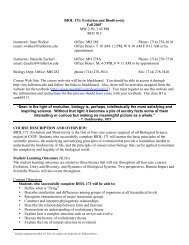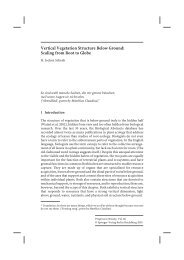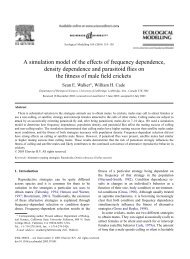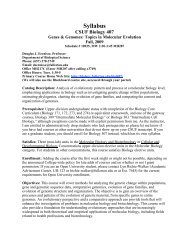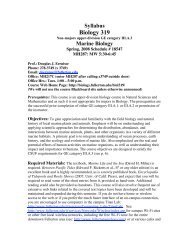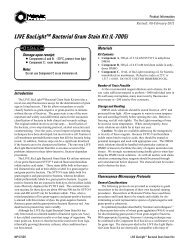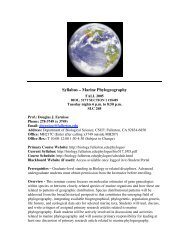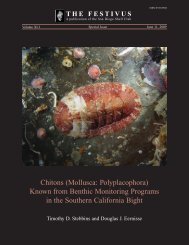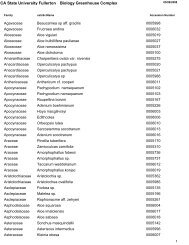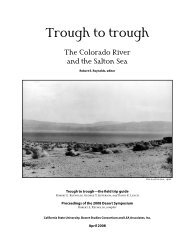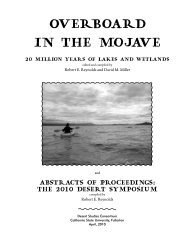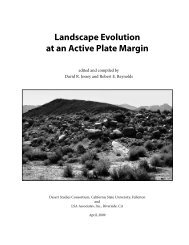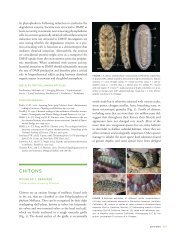Elements of Biology (Biol 101) - Biological Science - California State ...
Elements of Biology (Biol 101) - Biological Science - California State ...
Elements of Biology (Biol 101) - Biological Science - California State ...
You also want an ePaper? Increase the reach of your titles
YUMPU automatically turns print PDFs into web optimized ePapers that Google loves.
new advances in science. The principles <strong>of</strong> science provide the underpinnings<br />
<strong>of</strong> technology and, consequently, technology should be taught in conjunction<br />
with content directly linked to the scientific disciplines.<br />
3. The Life <strong>Science</strong>s category includes student learning <strong>of</strong> the following major<br />
scientific ideas:<br />
a. Living things are made <strong>of</strong> smaller structures whose functions enable the<br />
organism to survive.<br />
b. Living things depend on each other and the physical environment as they<br />
interact to obtain, change, and exchange matter and energy.<br />
c. The great diversity <strong>of</strong> living things is the result <strong>of</strong> billions <strong>of</strong> years <strong>of</strong><br />
evolution <strong>of</strong> organisms through the mechanisms <strong>of</strong> heredity, random change,<br />
and natural selection.<br />
Course Description and Objectives:<br />
“We’ve arranged a global civilization in which most crucial elements –<br />
transportation, communications, and all other industries; agriculture,<br />
medicine, education, entertainment, protecting the environment; and even<br />
the key democratic institution <strong>of</strong> voting – pr<strong>of</strong>oundly depend on science<br />
and technology. We have also arranged things so that almost no one<br />
understands science and technology. This is a prescription for disaster.<br />
We might get away with it for a while, but sooner or later this<br />
combustible mixture <strong>of</strong> ignorance and power is going to blow up in our<br />
faces.” (Carl Sagan. 1996. The Demon-Haunted World: <strong>Science</strong> as a<br />
Candle in the Dark.)<br />
In order to meet the General Education objectives for the Natural <strong>Science</strong>s and Life<br />
<strong>Science</strong>s, this course will introduce you to the basic principles <strong>of</strong> biology (see Life<br />
<strong>Science</strong>s goals), and will give you the tools to think like a biologist (see Natural <strong>Science</strong>s<br />
goals). Your pr<strong>of</strong>essor believes that you need to understand how the natural world works<br />
if you are going to have a good life, get a good job, and be a good citizen. The critical and<br />
creative thinking skills that you develop as you “do” science will help you in many areas<br />
<strong>of</strong> your life. For example, if members <strong>of</strong> your family have suffered from diabetes, how<br />
would you use genetic information about susceptibility to diabetes in thinking about your<br />
diet, and in planning whether to have children? If you choose not to have children, or to<br />
wait, what form <strong>of</strong> birth control should you use? If you choose to have children, should<br />
you feed them genetically engineered food? What about organic food? Should you take<br />
your family on holidays to areas that are vulnerable to extinction due to human contact?<br />
Should you take them to areas in which there are serious viral outbreaks?<br />
In this course, you will learn:<br />
1. the basic principles <strong>of</strong> biology;<br />
2. how to use these principles to analyze biological problems; and<br />
3. how to make decisions based upon your analysis.



